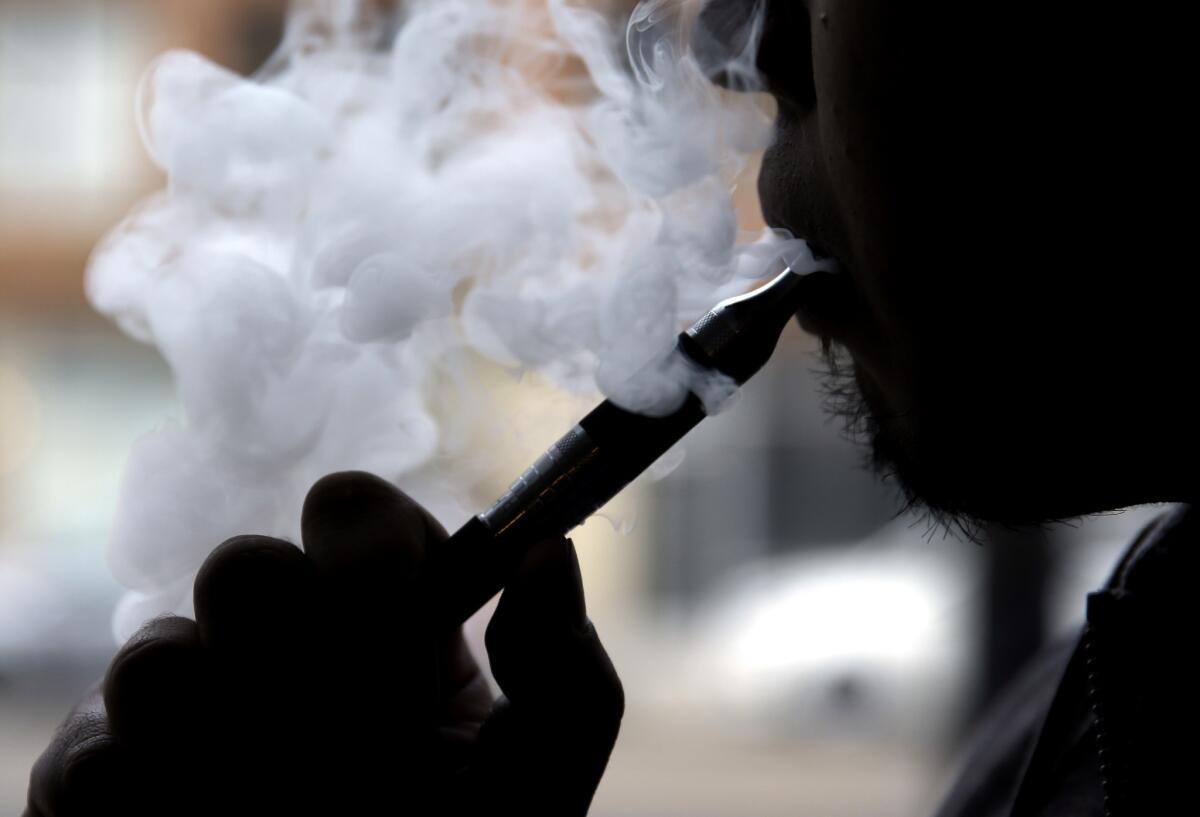Tobacco, vaping industries seize opportunities in coronavirus with freebies, donations

Running low on surgical masks during the pandemic? You can get two for free by ordering a Moti Piin, a battery-powered vaping pen, from the company’s online shop.
Or buy sleek cartridges from Smok, another e-cigarette brand, and earn chances to win disposable gloves and up to 10,000 masks.
“COVID19 RELIEF EFFORT” blasts the ad of another online shop offering two-for-one e-liquid vials. Buyers at another shop get 19% off nicotine e-juices if they enter the code COVID-19.
As the global pandemic strains the world’s inventory of medical supplies, the tobacco and vaping industries are taking advantage of a unique opportunity, offering freebie protective gear, doorstep deliveries and festive pandemic-themed discounts. Some players have donated ventilators and mounted charity campaigns.
The tobacco companies insist they are simply doing their part to help during the crisis. But the coronavirus-related marketing has been criticized by anti-smoking advocates who call it hypocritical and potentially dangerous. They note that people with lungs damaged by smoking are at an elevated risk if they catch the virus, and that vaping has been linked to a growth in tobacco use, particularly among teens.
“It’s as if they don’t realize they’re in the business of destroying lungs,” said Matthew Myers, president of the Campaign for Tobacco-Free Kids. “It literally takes your breath away. It makes the word ‘hypocrisy’ feel feeble.”
Researchers have long known the dangers of tobacco products, which kill more than 8 million people each year, according to the World Health Organization. Smoking weakens a person’s ability to fight off respiratory infections and drives up their risk of developing the types of chronic lung conditions that underlie many of the most severe coronavirus cases.
Health officials are adding the pandemic to their long list of reasons that people should quit. E-cigarettes can be efficient carriers of the virus, they note. They are often passed around and shared; smokers frequently touch their face and mouth. The smoke and vapor that waft through the air could spread infectious particles to people and surfaces nearby, say scientists.
But the American Vaping Assn. circulated an editorial in late March that urged state officials to lift bans of online e-cigarette sales, arguing that online sales promote safety because it keeps people from making trips outside their home. Continued access to e-cigarettes prevents people from relapsing back into smoking cigarettes, they added.
In one doorstep delivery promotion, a woman beams as she opens her vaping package, her fists raised in the air. In another, hand-in-hand models ask customers to help “build a community with a shared future for humanity.”
“Hurry and save today,” an Instagram ad said, with the hashtags #corona, #quarantine, #vapenation.
Research published in American and Chinese journals already suggests that tobacco users often fare worse with coronavirus infections. The effects of vaping on a case of COVID-19 are less conclusive, but scientists say a surge of lung infections tied to the habit last summer gives them reason for worry. “Because it attacks the lungs, the coronavirus that causes COVID-19 could be an especially serious threat to those who smoke tobacco or marijuana or who vape,” the National Institute on Drug Abuse, part of the National Institutes of Health, warned in a statement last month.
The tobacco industry has used the moment to enhance its public image, especially with charitable giving. The world’s biggest tobacco company, Philip Morris International, donated 50 ventilators to the government of Greece, which has one of the highest smoking rates in Europe. The country has seen 2,100 cases of COVID-19, and at least 100 people have died.
The company, which holds 40% of the Greek tobacco market, did not appear to publicize its donation and did not respond to an inquiry from The Times.
Gov. Ralph Northam of Virginia has asked tobacco companies to take on a similar role and supply respirator masks in the United States.
Altria, the maker of Marlboro cigarettes, announced a $1-million relief investment to help support vulnerable residents surrounding its headquarters in Richmond, Va., and other regions where manufacturing takes place. “Caring for each other and doing what’s right is core to our company,” Jennifer Hunter, the company’s senior vice president for corporate citizenship, said in a statement.
Altria said in a statement that its companies were “working to protect their employees, consumers and communities from the virus.”
Meanwhile, vape manufacturers and retailers are donating bottles of hand sanitizer to police and fire departments across the country, according to the Smoke-Free Alternatives Trade Assn.
Individual vaping companies did not respond to inquiries from The Times.
In Los Angeles, smoke shops have been among the businesses most resistant to orders that they close. Los Angeles prosecutors have filed criminal charges against two smoke supply establishments, accusing them of refusing to comply with the city’s strict Safer at Home order intended to slow the spread of the virus.
On the store shelves, N95 respirators and hand sanitizer tubes are stacked beside glass bongs and e-liquids. “TIMES ARE TUFF,” one shop’s signage read. “WE GOT YOU.”
“We had a smoke shop that just refused to close,” Mayor Eric Garcetti said. “And even when police officers were there, they said, ‘Forget you’ — probably not in as nice words — ‘we’re not going to do it.’” He said the city was going to move to shut off the shop’s power.
Unexpectedly high numbers of younger people have become severely ill from the virus, and some experts suspect a link to vaping. “The COVID-19 crisis should be a wake-up call that your age doesn’t matter if your lungs are compromised,” Myers said.
Most of the companies’ websites still include legally required disclaimers about age restrictions. But the flavors range from Oatmeal Cookies and Yogurt Drink to Blueberry Parfait and Watermelon Rush, a colorful cartridge displayed in its promotion next to a bright glass of juice. The Food and Drug Administration attempted to ban such flavors years before the trend ballooned among teenagers, only to have the plan rejected by top White House officials, a Times investigation found last year.
There may be a silver lining to e-cigarette sales during the extended quarantine. It’s much harder for addicted teenagers to keep the habit a secret, Myers said.
“Tens of thousands of parents are likely realizing for the first time: Their kids are definitely still vaping.”







